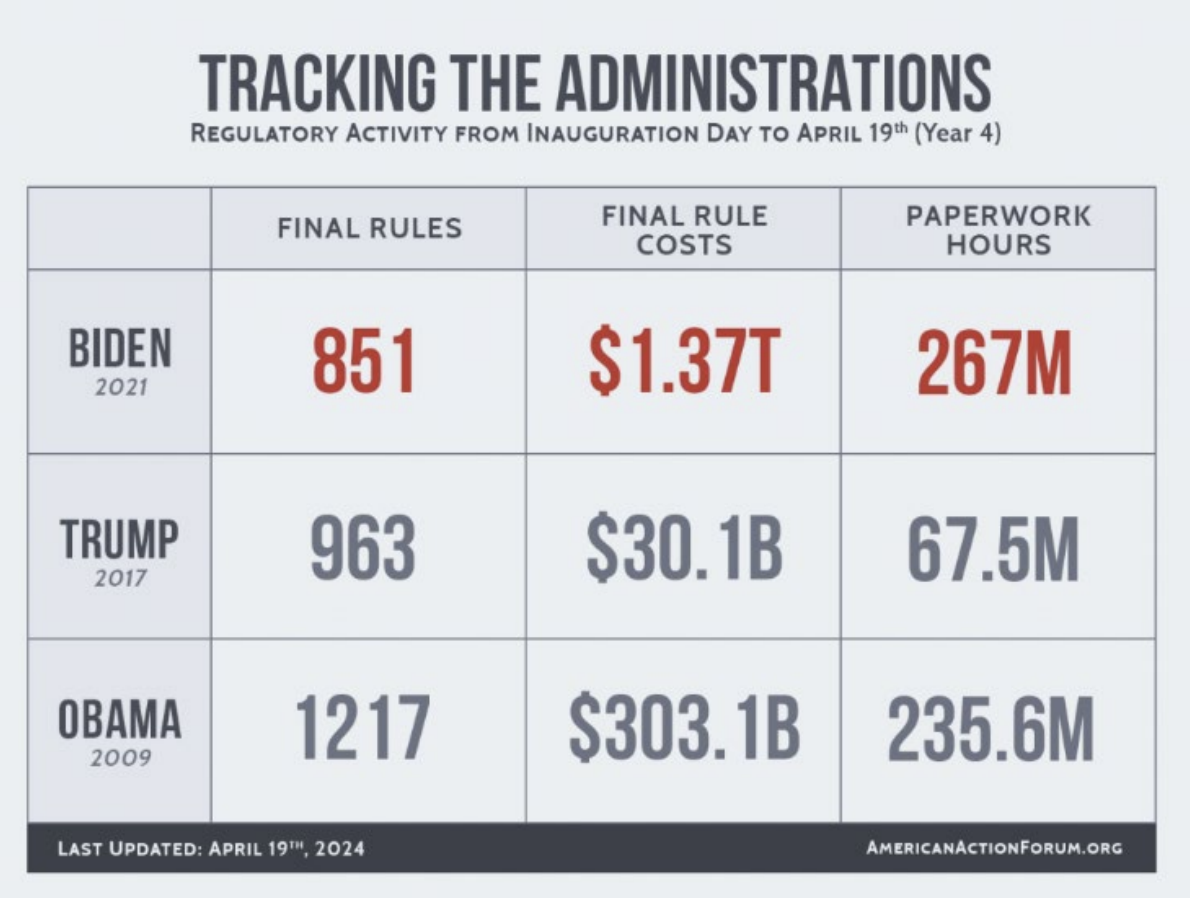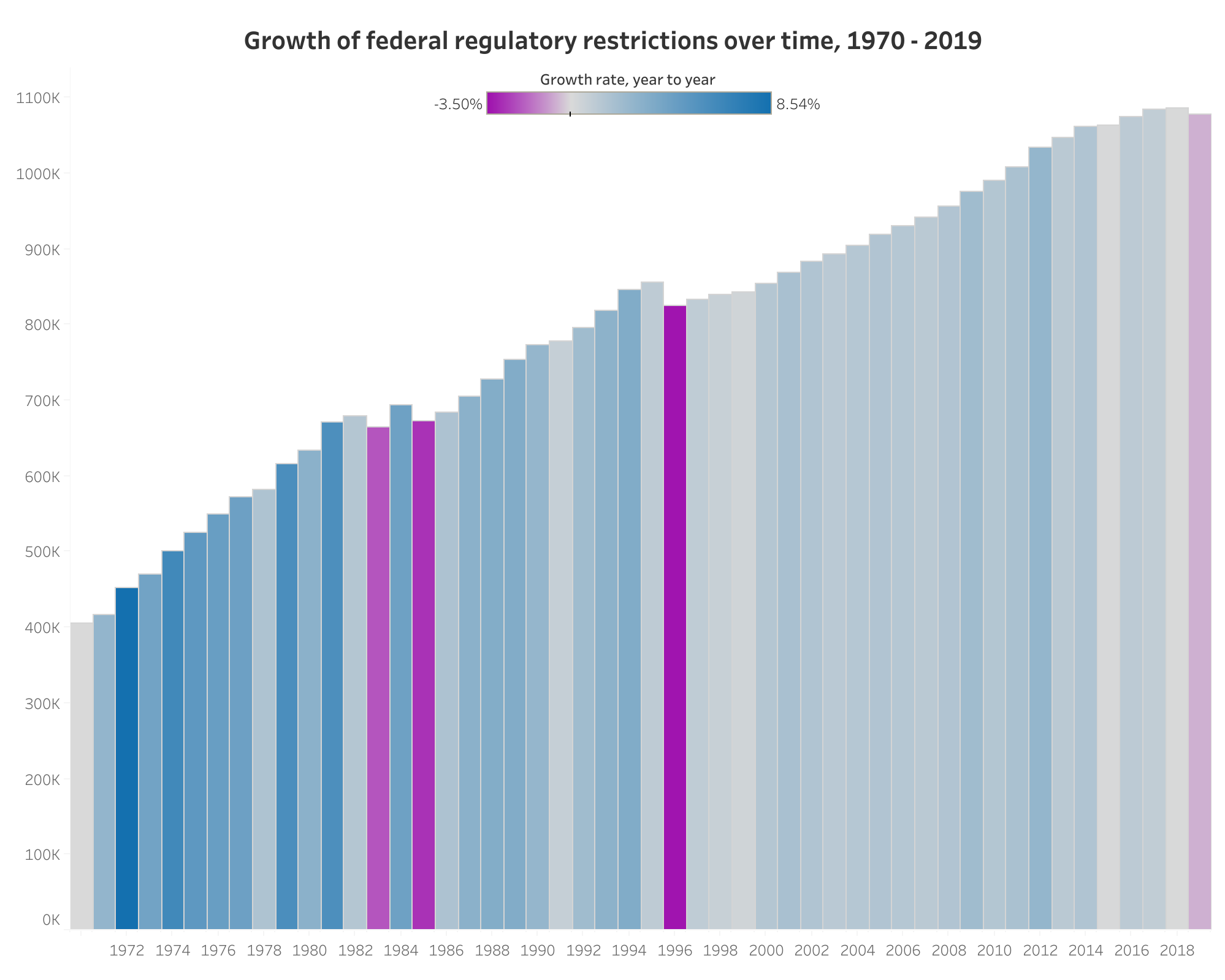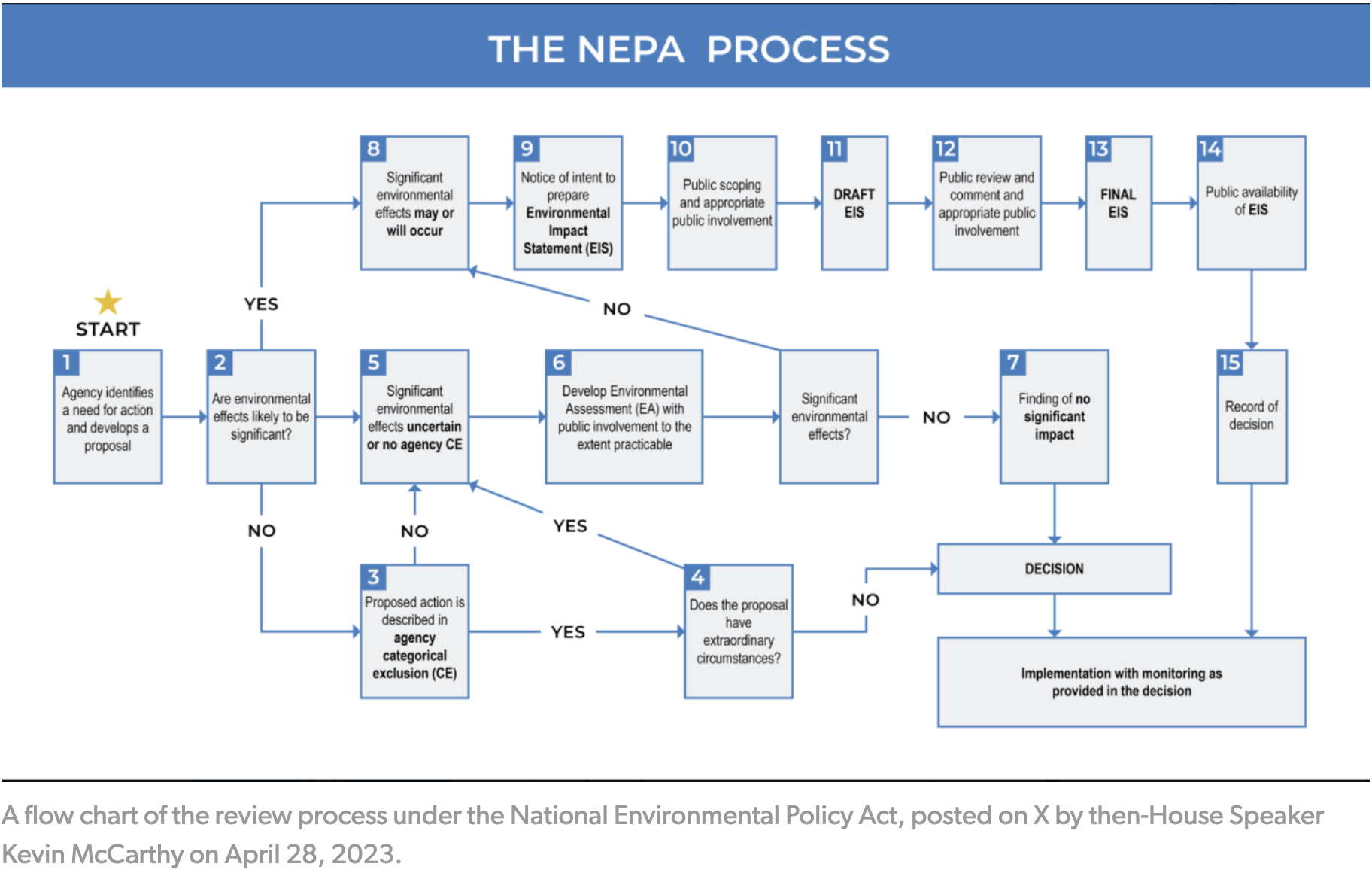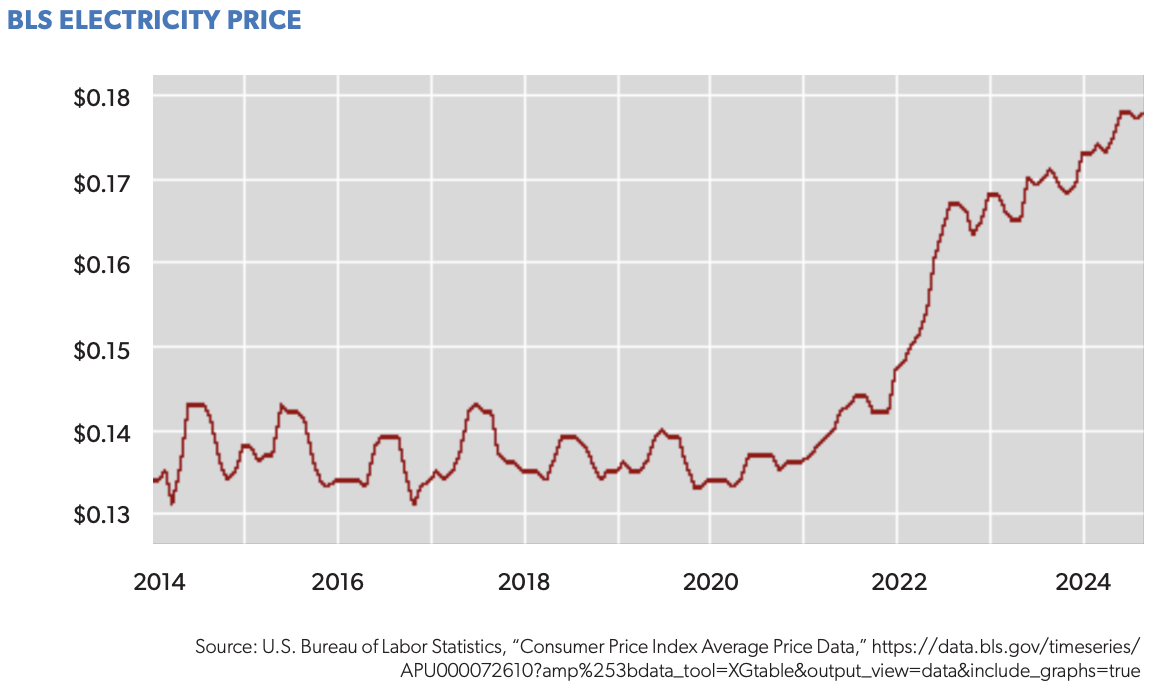Summary
The American Energy Blueprint is a comprehensive set of policy recommendations to guide the new Trump administration’s approach to energy policy. The Blueprint outlines key reforms in areas such as federal land and water use, expanding consumer choice, reducing subsidies, curbing government spending and taxation, streamlining regulations, and modernizing the permitting process.
________
Download The Full American Energy Blueprint Here
________
Federal Lands and Waters
The Biden administration launched an unprecedented attack on energy development on federal lands. From restricting land use to slowing or halting permitting approvals and raising fees, the administration did seemingly everything to make energy development on federal lands more difficult and more expensive as part of its pledge to “end fossil fuels.” The Trump administration should take swift action to reverse these actions and Congress should update statutes to ensure such abuse cannot happen again in the future.

Administrative Actions:
- Reverse restrictive Biden actions in ANWR and NPR-A, and revoke other Alaska land-use limitations on energy and minerals. Alaska is over twice the size of Texas; two-thirds of it is federally owned and 86% of it is inaccessible by road.
- Reverse the illegal denial of an access road to Alaska’s Ambler Mining District, one of the U.S.’s most potentially prolific sources of valuable rare earth minerals.
- Bureau of Ocean Energy Management should proceed with Lease Sale 262 in 2025, as planned, and create a new, more comprehensive Outer Continental Shelf (OCS) five-year leasing program, including at least two lease sales per year in the Gulf of Mexico (GOM). With the current OCS five-year leasing program under litigation, the administration should request a voluntary remand to resolve all pending petitions.
- Release a new offshore leasing plan.
- Approve permits for new mines.
- Executive order to reconsider all Biden administration decisions on land withdrawals from energy or mining leasing.
- Reverse the Biden actions requiring higher fees and costs for production in certain areas.
- Review, reverse, and shrink Biden Obama-era national monument designations.
Additional resources from IER:
- 2024 North American Energy Inventory
- Alaska Sues Biden Administration Over Restrictions on Upcoming ANWR Lease Sale
- Biden-Harris Administration Suspends Water and Wetlands Permit for Ambler Mining Road in Alaska
- Biden to Ban Offshore Oil Drilling in Some Federal Waters
- The Economic and Strategic Importance of Domestic Mineral Production
- Enormous Lithium Discovery in Arkansas
- Biden’s Confounding Oil and Gas Leasing Policy
- Biden’s Plan for a 20-Year Ban on Energy Leasing in Nevada
- Biden-Harris Administration Has Closed Coal Leasing in the Powder River Basin
- Biden Attacks the Oil and Gas Industry, Removing Public Lands from Development, Raising Production Costs and Cutting Back on Land Offered at Auction
- IER Applauds President Trump’s National Monuments Executive Order
Legislative Actions:
- Turn mismanaged federal lands over to the states and look for opportunities to privatize them.
- Antiquities Act reform: Require monument designations to be approved by Congress, not by a unilateral presidential act.
- Repeal Inflation Reduction Act (IRA) provisions increasing costs of production on federal lands.
Additional resources from IER:
- Oil and Natural Gas Production on Federal and Non-Federal Lands
- Biden Attacks the Oil and Gas Industry, Removing Public Lands from Development, Raising Production Costs and Cutting Back on Land Offered at Auction
- The Economic and Strategic Importance of Domestic Mineral Production
- 2024 North American Energy Inventory
________
Consumer Choice
The American people have the right to choose the consumer products that best fit their needs and budgets. However, the Biden administration aggressively sought to restrict the types of durable goods, such as cars and appliances, that are available for sale. This burdens consumers with higher costs and often forces them to purchase inferior products. The new administration must quickly withdraw these rules that unlawfully restrict consumer choice, while Congress should work diligently to repeal or reform the underlying legislation that enabled the abusive rulemaking.

Administrative Actions:
- Reconsider and repeal the EPA’s tailpipe emissions rules for all vehicle classes.
- Reconsider and repeal the 2027-2032 CAFE standards.
- Revoke the California waiver: revoke the ACC I waiver and deny the ACC 2 waiver (or CRA).
- Deny or withdraw other unlawful California waivers that have been requested or granted (trains, trucks).
- Reconsider the Biden administration’s excessive appliance standards on gas stoves, home heating, furnaces, dishwashers, and other appliances. Consider creating new product classes to ensure that important appliance features have not been lost through the imposition of over-strict regulations.
- Executive Order: Ban any agency action that prohibits or substantially limits energy by targeting any one particular source, absent direction from Congress.
Additional Resources From IER:
- When Government Chooses Your Car: Examining the Challenges and Complexities of a Transition to Electric Vehicles
- IER files Amicus Curiae Brief in Ohio v. EPA
- IER Comment on National Highway Traffic Safety Administration Proposed Rule – Corporate Average Fuel Economy Standards for Passenger Cars and Light Trucks for Model Years 2027-2032 and Fuel Efficiency Standards for Heavy-Duty Pickup Trucks and Vans for Model Years 2030-2035
- CAFE Compliance Will be Harder with DOE Proposed Rule Change
- Free Market Coalition Comment on EPA Proposed Rule California Motor Vehicle Pollution Control Standards; Request for Waiver
- Missing The Train: How CARB’s New Regulations Fail to Appreciate the Considerable Supporting Energy Infrastructure Requirements Needed for Rail Electrification
- Biden Administration Continues to Attack Natural Gas Stoves
- Biden’s Energy Department Releases New Efficiency Standards for Dishwashers
- EPA Finalizes the Affordable Clean Energy Rule, Replacing Clean Power Plan
- Save Our Cars Coalition
- EV Focus
Legislative Actions:
- Repeal the Corporate Average Fuel Economy Standards.
- Repeal the Renewable Fuel Standards.
- Repeal Appliance Efficiency Standards.
Additional Resources From IER:
- Overview of Federal EV Policy
- Renewable Fuel Standard Policy Brief
- Biden Limits Consumer Choice on Hot Water Heaters
- Biden-Harris Administration Attacks More Appliances, Increasing Cost and Reducing Quality
________
Subsidies and Spending
The Biden administration, with the help of Congress, engaged in an unprecedented spending binge in the energy policy space. Subsidies were created en masse for favored products and energy sources, slush funds were created to subsidize left-wing activism, spending prioritized political activism over scientific research, and tax rules were bent to hand out even more money than Congress authorized. These actions are exploding deficits and distorting energy markets, creating a death spiral of subsidization that threatens their resiliency. Where possible, the administration should halt this spending by agency action, and Congress must follow up by repealing the trillions of dollars of subsidies that were passed, particularly in the misnamed Inflation Reduction Act.
Administrative Actions:
- Replace Treasury guidance for IRA credits to enforce the content requirements passed by Congress.
- Halt and review all of the Department of Energy loan programs.
- Revoke and rescind the U.S. International Climate Finance Plan.
- Halt funding for Department of Energy awards that were not “awarded” by the inauguration.
- Halt all climate bank contributions.
- Halt green group slush funds and environmental justice initiatives that were created during the last administration.
- End the American Climate Corps.
- Review all power purchasing agreements the federal government has negotiated under the Biden administration and review to ensure federal facilities are not paying above market rates.
- Executive order: Provide guidance on research funding. RCP 8.5 or similar extreme scenarios should not be used in projects that receive federal research dollars.
- Executive order: All federally funded research must be made available free to the public and underlying data and models must be made available for review.
- Review Treasury and IRS guidance on repowering rules for renewable tax credits.
- Eliminate the Department of Energy Clean Energy Corps and other agency Climate Corps initiatives (American Climate Corps).
- Conduct an audit and oversight of money distributed by the Biden administration to political and activist groups.
- Direct the Energy Information Administration to update and publish the discontinued report: Federal Financial Interventions and Subsidies in Energy.
Additional Resources From IER:
- The Challenges and Costs of Net-Zero and the Future of Energy
- Treasury Department Defines Rules for the Clean Electricity Production and Investment Tax Credits
- The Inflation Reduction Act Bloats Tax Subsidies to Biden’s Favorite “Green” Technologies
- Slash it: The IRA
Legislative Actions:
- Repeal Inflation Reduction Act’s tax credits.
- Provide guidance to the Federal Reserve to clarify that integrating climate scenarios into their analysis is outside of the Institution’s mandate.
- Clawback the IIJA and Chips and Science spending (EV charging, research spending, etc).
Additional Resources From IER:
- Biden and Harris are Wasting Your Money Again on Green Energy Projects
- The Inflation Reduction Act Bloats Tax Subsidies to Biden’s Favorite “Green” Technologies
- Biden’s Massive EV Charging Station Failure
________
Taxes and Regulation
The Biden administration regularly bragged about taking an “all-of-government” approach to controlling energy policy through every possible regulatory avenue. The new administration must take a similar “all-of-government” approach to reversing the legacy of damage and market distortion.

Administrative Actions:
- Withdraw from the Paris Agreement under the United Nations Framework Convention on Climate Change.
- Withdraw the EPA’s methane rule.
- Withdraw the EPA’s power plant rules.
- Provide Jones Act waivers for the transportation of liquified natural gas.
- Review the EPA’s National Ambient Air Quality Standards (especially ozone).
- Ensure that the global effects of a rule, regulation, or action are reported separately from its domestic costs and benefits.
- Revoke Executive Order 14030 of May 20, 2021, on climate-related financial risk.
- Make clear that the SEC, Treasury, Comptroller of Currency, CFTC, or any other financial regulator may not take action to discriminate against the production or use of any energy source, or take other climate-related actions, without express direction from Congress.
- Revoke all executive orders establishing an environmental justice framework in the federal government.
- Withdraw Biden administration’s social cost of carbon.
- Or reform to use a 7% discount rate.
- Review and reconsider the EPA’s endangerment finding for carbon dioxide emissions.
- Withdraw Biden CEQ NEPA regulations.
- Take regulatory action to match the Waters of United States definition outlined in the Sackett decision.
- Executive order directing all agencies to eliminate any environmental justice requirements from any regulations, contract tendering, employment, etc.
- Executive order eliminating all energy and climate mandates in federal procurement and contracting.
- Repeal the EPA’s “good neighbor” rule that threatens energy infrastructure. Since the rule is currently under litigation, it should be suspended while the agency works to repeal it.
- Withdraw Biden A-4 circular update.
- Withdraw from Biden methane pledge.
- Review endangerment findings for CO2.
- Withdraw the Department of Labor rule on ESG investing with retirement accounts.
- Executive order: Review EPA greenhouse gas reporting program.
- Review the Commodity Futures Trading Commission’s “Green Guide” classification of carbon credits.
- Executive order: Suspend all agency climate action plans pending reviews and cost-benefit analysis.
- Exempt crude oil, natural gas, and energy-intensive critical supply chain inputs from across-the-board tariffs to maintain the administration’s goal of preserving American energy dominance.
- Extend all existing petitions and expedite any future petitions for Section 232 tariff exclusions for products critical to the oil and natural gas industry that cannot be sourced domestically to meet the required procurement specifications.
Additional Resources From IER:
- Biden-Harris Administration Regulatory Costs Are Astronomical and President-Elect Trump Has a Mandate to Fix It
- 250 Ways the Biden-Harris Administration, and Their Allies, Have Made it Harder to Produce Oil & Gas
- Americans Voted to Make U.S. Energy Dominant and to Continue Using Natural Gas
- EPA Finalizes Methane Rule Associated with the Inflation Reduction Act Reporting Requirements
- The Biden-Harris Administration Proposes Another Rule Affecting Power Plants
- The Supreme Court Will Not Stay the EPA Power Plant Rule While It Goes through the Lower Courts
- Jones Act Waiver Would Set U.S. LNG Free
- The Jones Act: Distorting American Energy Markets Since 1920
- The Environmental Quality Index
- EPA Ups Estimates for the Social Cost of Carbon
- The Supreme Court Takes on a Case Involving the National Environmental Policy Act
- Biden-Harris Administration Claims Jurisdiction Over Wetlands on Alaska’s North Slope
- EPA Finalizes Methane Rule Associated with the Inflation Reduction Act Reporting Requirements
- Biden Has Set a New Climate Goal for States to Achieve
- ESGing Your Retirement
Legislative Actions:
- Repeal the methane tax.
- Pass the REINS Act.
- Reform NRC, and appoint commissioners, so that new nuclear generation has a regulatory path consistent with development, not obstruction.
- Reduce the corporate tax rate below 20%.
- FOIA reform:
- Reform the Foreseeable Harm Standard – Federal agencies often cite the “deliberative process” privilege to redact substantial information from public records. Congress can improve this standard by mandating that agencies consider specific factors when evaluating potential harm from disclosure.
- Ensure systematic preservation and searches of text messages, emails, calendars, and other communications.
- Subject government contractors to FOIA when they are engaged in public functions.
- Prevent infinite delays by consults.
Additional resources from IER:
- Biden-Harris EPA Finalizes Methane Tax on Oil and Gas Operations
- Big Tech Wants Nuclear Power as Renewable Energy Is Unreliable
- Putting AI’s Insatiable Electricity Demand in Perspective
- U.S. Withdrawal from the Paris Climate Accord: Five-Year Anniversary
- FERC Transparency Project
________
Permitting Reform
It is far too expensive and time-consuming to build just about anything in America, but energy infrastructure and development are particularly difficult. The Biden administration exacerbated this by throwing up every administrative hurdle they could conceive. Reversing the Biden administration’s actions is immediately necessary, but Congress must also undertake some serious work to reform the statutes that govern the permitting process.

Administrative Actions:
- Appoint FERC commissioners that will withdraw the proposed pipeline rule and transmission rule.
- Resume permitting approvals for LNG exports.
- The Army Corps of Engineers should complete its environmental review for the Line 5 project in Michigan and grant the project a permit to proceed.
- Review permitting requirements for new and expanding refineries.
- Reform the water permitting process to make clear that state input cannot be an automatic veto.
Additional Resources From IER:
- New Report Proposes Regulatory Reforms to Streamline US LNG Exports
- Will Any New Refineries Be Built in the United States?
- EPA’s Proposed Rule Regarding the Clean Water Act
- Biden Administration Releases LNG Export Report
Legislative Actions:
- National Environmental Policy Act (NEPA) reform:
- Repeal the Biden administration’s NEPA Phase 1 and Phase 2 rulemakings and replace them with updated guidance consistent with economic growth and the rule of law.
- Recognize that the White House Council on Environmental Quality (CEQ) does not have the statutory authority to create binding NEPA regulations for other federal agencies.
- Rescind CEQ’s NEPA regulations wholesale and rely on the individual agencies to individually promulgate NEPA regulations as may be required.
- The consideration of the Social Cost of Carbon analysis is inappropriate and should not be used in the development of environmental documents under NEPA.
- Remove controlled burns on federal lands from the list of major federal actions for NEPA.
- Endangered Species Act (ESA) reform:
- Clarify that habitat modification is not the “taking” of a species under the ESA. The ESA defines “take” to mean “harass, harm, pursue, hunt, shoot, wound, kill, trap, capture, or collect, or to attempt to engage in any such conduct.” That should be the definition and not adverse habitat modification. ESA should be for species protection, not to control land use.
- The Fish and Wildlife Service should repeal the FWS-NMFS regulations on “foreseeable future” (Section 4), “critical habitat” (Section 7), and the blanket application of the Section 4(d) rule.
- Eliminate the need for cross-border permitting for pipelines.
- Litigation reform (standing, payment of court fees).
- Review permitting requirements for new/expanding refineries.
- Reform the water permitting process to make clear state input cannot be an automatic veto.
- Revoke Interior Secretary Order 3398 reinstating American Energy Dominance as a national goal.
Additional Resources From IER:
- Appeals Court Rules that Federal Agencies and Courts Have Misinterpreted NEPA
- The Supreme Court Takes on a Case Involving the National Environmental Policy Act
- Biden-Harris Administration Is Stifling Oil and Gas Drilling Again—This Time in the West over Sage Grouse Habitat
- Endangered Species Act Decision Endangers Gulf of Mexico Oil and Gas Production
- Keystone XL Pipeline Canceled
- California Energy Commission Proposes to Take Over State Oil Refineries
________
Conclusion
IER’s recommendations are grounded in several core principles:
Free Markets: History has demonstrated that private property rights, market competition, and the rule of law are essential to providing affordable energy, enhancing living standards, and fostering a cleaner environment.
Objective Science: Public policy, especially in the realm of environmental issues, should be driven by objective, evidence-based science, rather than emotional appeals or speculative scenarios that often lead to counterproductive government interventions.
Public Policy Tradeoffs: Policies that aim to address market failures in the energy sector must also account for the potential for government failure. It is critical to recognize that government actions, influenced by politics and bureaucracy, rarely mirror the idealized outcomes envisioned by policy advocates.
Efficient Outcomes: Policy decisions should consider the interests of energy consumers, producers, and taxpayers in a balanced and efficient manner, seeking outcomes that benefit all stakeholders.
Impartial and Unbiased: Government policies should be transparent, simple, and technology-neutral. This approach will encourage investment in the energy sector and drive innovation
________
Prepared by Kenny Stein, Vice President of Policy | [email protected]
________
Download The Full American Energy Blueprint Here
________




